'I was raped as a student - and I’m not the only one'
- Published

When Hannah Price was sexually assaulted as a student, she felt unable to report it. She has since discovered she is far from alone - and that sexual assault may be far more common on campus than official figures suggest.
I don't remember being taught about consent at school, other than "No means no." What I do remember is being told not to walk home on my own, or I'd risk being raped by a stranger in a dark alley. But when I was raped it was not in the street, but in my own student house, and I had taken the precaution of being walked home by someone I knew.
It was the first social event of that academic year at the University of Bristol and it had been a fun night. It was everyone's favourite time of term - lectures had not properly begun and deadlines were still far from our minds. I drank, laughed and danced until I was ready for sleep.
As I was leaving the club, a guy also at the social said he lived near me and offered to walk me home. Walking home alone, late at night, in the dark was something I actively tried to avoid, so I gladly accepted his offer. We'd only met a few weeks before, so conversation was light - we chatted about the night and what to expect in the new term.
When we got to the steps that led up to my house, he politely asked if he could pop inside for a glass of water because he was feeling unwell. Maybe this is when I should have heard alarm bells, but even as I was pouring the drink in my kitchen nothing struck me as amiss. Not until after he'd finished the water, and the pretence was over.
With his first demand to go to my room, came my first rebuff - my first spoken "No."
To this day, it still strikes me how a charming disguise can so quickly disperse, and turn into aggression.
Despite my refusal to go to my bedroom, and my repeated attempts to get him to leave, he was relentless: "Why would you let me in if you didn't want something to happen?"
The more I said I wasn't interested, the more forceful he became. I lost count of how many times I said "No". And then suddenly there was someone physically stronger than me, refusing to leave until he got what he wanted. His hand grabbed my arm so fiercely that it became instantly clear that his intentions had never been to get me home safely.
It is a strange feeling, being so paralysed by fear in your own living room. In that moment, I realised saying "No" wasn't going to be enough.
He took off my tights. When he was done he finally left.
The next day I locked myself in my room, only leaving to shower away the reminders of the night before. I lay there overwhelmed with disgust, self-blame and guilt.

You may also be interested in:

I never reported what happened to anyone in authority.
Who would believe me if I did? I had been drinking. I let him into my house. I didn't physically try to fight him off - fear took over. Surely that meant it was my fault?
What happened didn't fit any label that I recognised: he wasn't a stranger, there was no dark alley.
I knew I would have to see him again. I was in a student bubble, studying and socialising with my peers - even at an institution as big as my university was, bumping into someone is inevitable. And because of his charismatic public persona and popularity it seemed easier, and less traumatic, to suppress what had happened, than face up to it.
This was my first time living independently. There was no-one I felt I could turn to at the university. I worried that what happened wasn't "serious enough" to be believed or taken seriously.
The university's policy stated that if you were reporting what was a criminal offence they couldn't and wouldn't do anything until it had been dealt with by the police.
But I was wary of going to the police. The year before, I had reported another student to the police for attacking me in a nightclub. There were witnesses and CCTV evidence - nevertheless, the fallout was hugely stressful. I was alienated from some of my friends. I had to deal with the anxiety about running into that student on a daily basis - my mental and physical health quickly declined.
Multiply that by 100 and that is what I imagined reporting my sexual assault to the police would be like.

Help and advice

The process for sexual assault can take ages. How would my studies be affected by a serious criminal investigation and trial?
The likelihood of bumping into my perpetrator wouldn't reduce over that time, so would I even be safe? There would also be the embarrassment and fear of being shamed and the added doubt that our mutual friends might not even believe me, and accuse me of ruining someone's life.
So I told no-one, I saw him all the time and forced myself to pretend that it was nothing.
But every now and then there would be glimpses to remind me of what happened - moments where he would stand a little too close or persistently message me late at night.
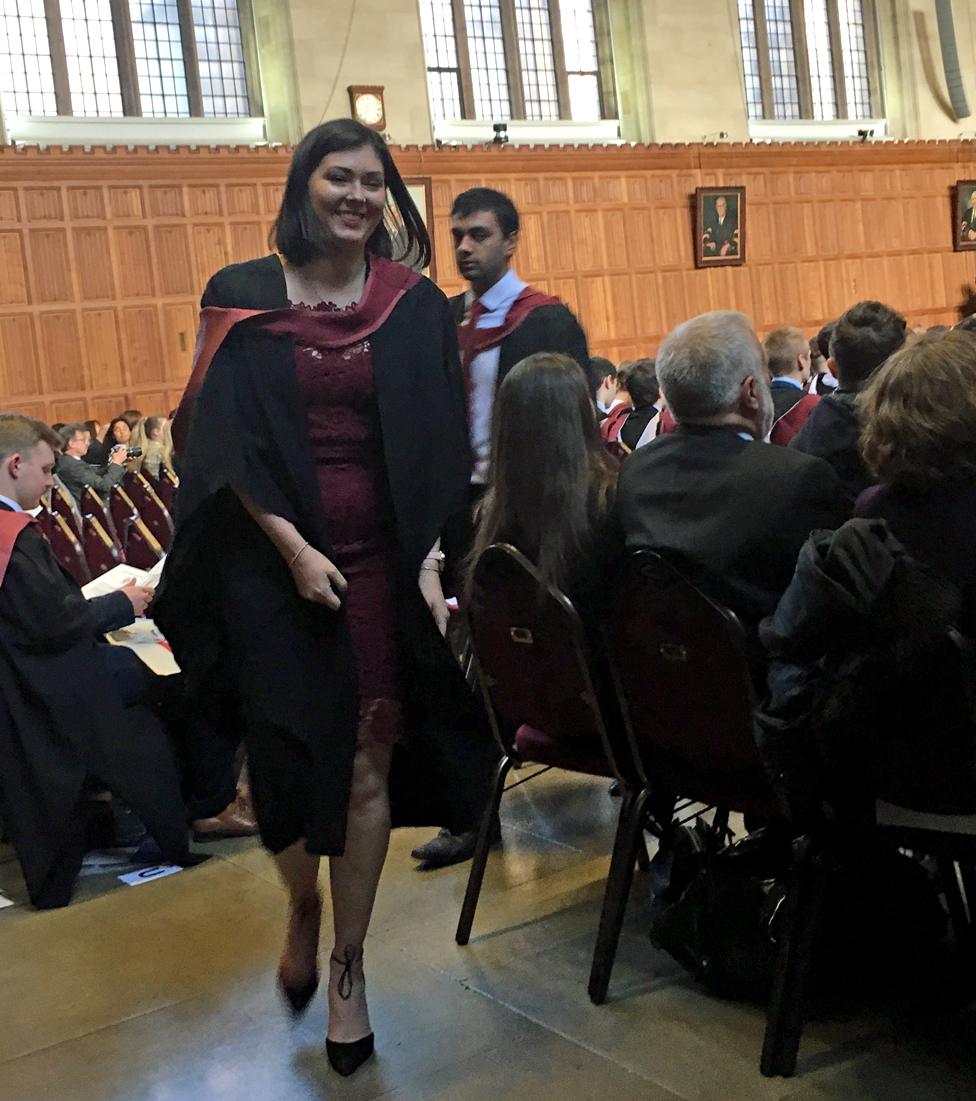
Hannah's graduation day
That night was over three years ago. Yet, it wasn't until this summer, when I was done with my degree and had left university that I was able to acknowledge to myself, and others, that I was raped.
And I'm not alone. What's shocking is how many other stories there are like mine.
As a student journalist, I searched for a long time for a way to bring this issue of sexual assault and harassment on campus into the spotlight but, like me, no-one was comfortable enough to speak out publicly.
After reading an article about two incredibly brave rape survivors in India who maintained their anonymity by using social media, Snapchat suddenly seemed like the perfect fit - it's an innovative and modern platform that millennials are familiar with. The app's facial and voice-disguising software allows each participant to disguise their identity to the level they're comfortable with, while capturing their raw emotion and strength.
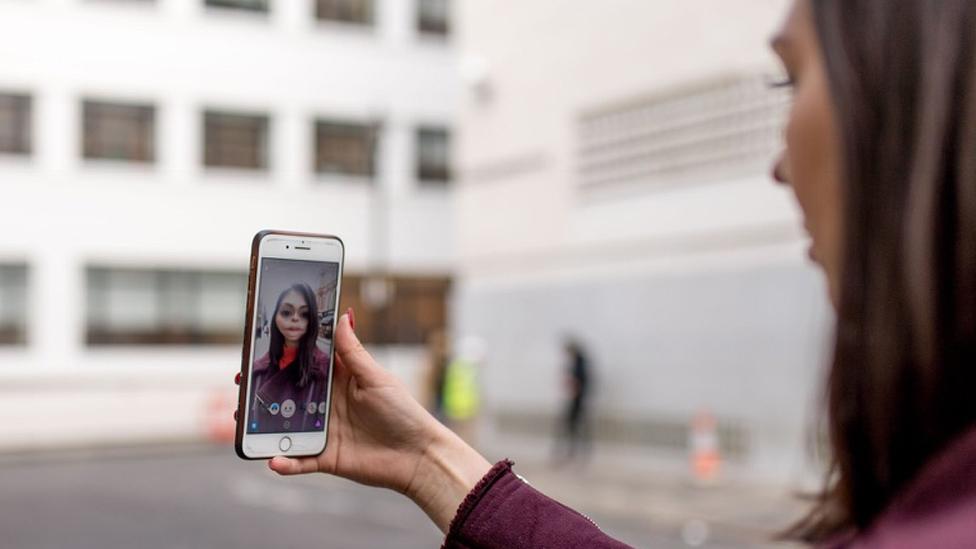
Snapchat allows users to apply filters that alter their appearance
And so I founded a campaign, Revolt Sexual Assault, to expose the real nature and extent of sexual assault and harassment experienced by former and current students at university in the UK, and call for policy reforms to address this problem.
I've now heard countless stories of sexual violence from brave students - each of which has been incredibly powerful and impossible to forge. Beneath the filters, you can see the deep and long-lasting effects that these assaults have had on survivors.
'Something has to change'
Part of the problem is that people don't recognise sexual assault and harassment when it happens - because it happens so much.
Since I was of secondary school-age I've been cat-called at bus stops - men twice my age would shout out what they would like to do to me and my friends. Passers-by didn't bat an eyelid, so soon I didn't either - it was "normal".
I've been looked up and down like a piece of meat, I've left train carriages and bars because of how uncomfortable I was made to feel, and been told I deserved it for how I was dressed. In broad daylight, on my way to the library, I was groped in the street.
In my second year, when someone grabbed my bum in a club and I told them that that was sexual assault, I was met with laughter - and in another case, a punch in the face.
I've listened to women almost casually open up to experiences of waking up in the night to someone having sex with them, while they had been unconscious - and then go on to rationalise their rapists' actions, truly believing it was their fault for going home with that boy, or for drinking too much.
The sad reality is that the more students I listen to through Revolt Sexual Assault, the same themes emerge: students like me are suffering in silence, blaming themselves and having their student years spoilt because of sexual violence and the lack of support available from universities.
But there is very little data available. Universities themselves record very low numbers of sexual assault and harassment. That's why, in partnership with The Student Room, an online student community, we launched the first national survey on this issue in a decade.
The number of responses to the online survey suggests that this problem is widespread.
4,500 students from 153 different institutions in the UK responded, most reporting sexual harassment or assault
10% reported their experiences to the university or police
6% reported an experience of sexual violence to the university
2% of those who reported sexual violence to the university were satisfied with the reporting process
31% of students felt pressured into doing something sexual
It's easy to dismiss these statistics because the sample was self-selected and depended on individuals choosing to answer, but behind the numbers there are young people with real stories to tell.
We gave students the option to expand on their answers, and thousands felt strongly enough to do so. Reading each of these accounts was heartbreaking.
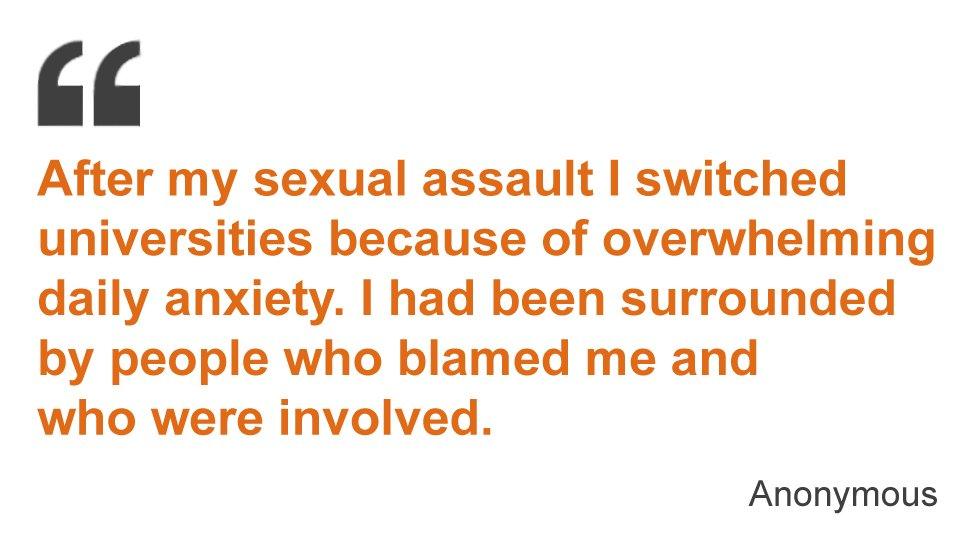
But the most telling results for me were how few respondents felt they had received the help they needed.
Many young people experiencing sexual violence in the UK don't feel supported enough by their universities to go to the police, or to ask for help. Why?
Now that movements such as Me Too and Time's Up have had such an impact, it's time to have a conversation about sexual violence on campus.
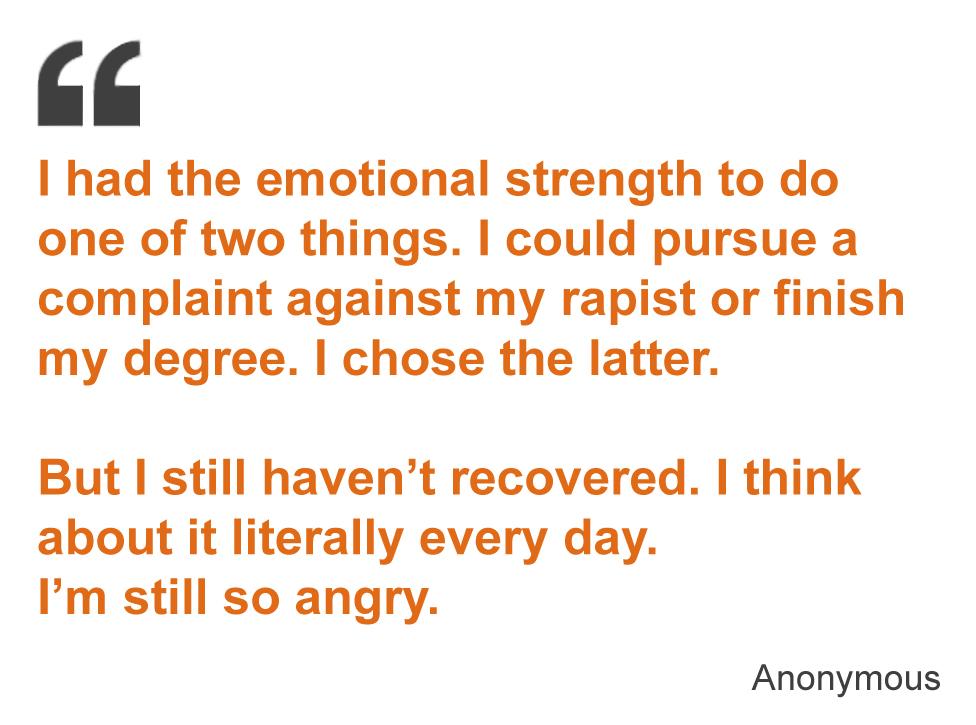
Since I first wrote about my own experience, trolls have criticised my story, victim-blamed me, called me an attention seeker, a liar and a slut, devalued my feelings, belittled my campaign and accused me of ruining my attacker's life (though I have never named him).
But I have already done these things to myself. Thousands of young people like me have done them to themselves. And this is why a change in culture is so important.
I've had the pleasure of meeting some of the strongest, most amazing people through my work at Revolt Sexual Assault. I am in awe of their decision to trust me with their stories. It is thanks to them that I have come to terms with what happened to me.
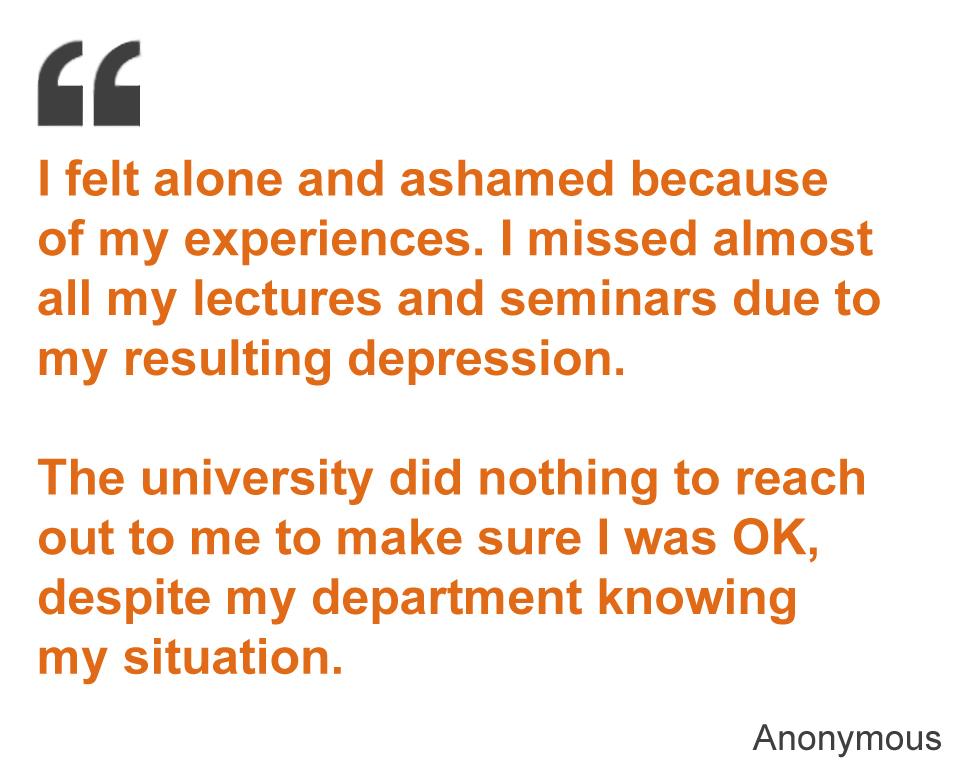

Mark Ames, Director of Student Services at the University of Bristol, said:
We're sorry to hear that Hannah felt unable to report the sexual assault or reach out for any support.
The welfare of all our students is vitally important to us and we have a zero-tolerance approach to sexual harassment and clear policies are in place to deal with complaints.
Specialist staff, including staff within our student counselling and health services, are trained to respond to incidents of sexual assault and refer students to specialist external agencies such as The Bridge, Bristol's Sexual Assault Referral Centre.
We realise that it can be difficult for students to report these issues. To make this process easier, we are launching an online 'Report and Support' portal this year for survivors of sexual violence and other forms of harassment.
We are also introducing major new investments in wellbeing in our academic schools, in central services such as our student counselling and health services, and a review of pastoral support in our halls to provide 24/7 support from staff who are on duty rather than on call.

Photographs courtesy of Hannah Price
Join the conversation - find us on Facebook, external, Instagram, external, YouTube, external and Twitter, external
